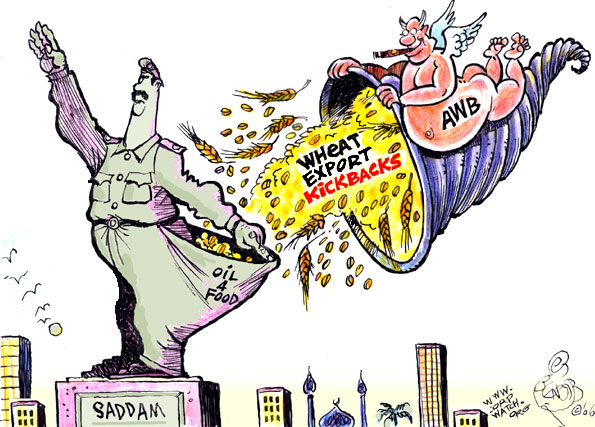The facets of Australian fascism: the Abbott Government experiment (Part 35)

By Dr George Venturini*
Testing the thesis (continued)
9
(Power of corporations protected)
Collusion between business and government is as old as Australia.
In 1789, one year after the establishment of the penal colony, a regiment was formed in England and called the New South Wales Corps. The remote destination and the function of policing convicts attracted part-time officers, troops of ill repute and adventurers. The regiment began to arrive in 1790 and completed the military rule of the place. The distribution of ‘other people’s’ land began amongst officers of the Corps. Produce was sold to the government store. There being no local currency, rum was substituted as the medium of trade. The officers in charge arranged the first monopoly and earned for the Corps the moniker ‘The Rum Corps’. The related social consequences continued until the arrival of Governor Macquarie. It was under his regime that the first hospital was erected by a public-private partnership which was funded on the rum trade monopoly. That trade began to decline twenty years later.
Corruption in public life continued. The ‘free-market’ illusion arrived almost two hundred years later, while governments remained actively ‘pro-business’.
An aspiring politician would court suicide by declaring that s/he favours regulation of business in the interest of the community. That would quickly be branded as ‘socialism’. On the contrary a clear statement of being ‘pro-business’ could increase the chance of success. Business operators would appreciate that, though they often appear to be torn between a desire to be left alone – and thus avoid any oversight – and the expectation that, as ‘producers’, they should receive special favours. These come in all shapes, as even recent events concerned with the euphemistically-called Global Financial Crisis demonstrated: subsidised loans – which often benefit small business, direct subsidies for all kinds of corporate exercises, resource privileges, monopolies when necessary, ad hoc legislation and trade protection, and when all other things fail: bailouts – especially for banks, insurance corporations, and car manufactures until recently.
While there may be an appearance of division between two sides of Parliament under the Westminster System, that ‘system’ should realistically be regarded as a bird trying to fly with two right wings. In Australia they are called the Labor Party and the Coalition – made up of the so-called urban ‘Liberals’ and the Agrarian Socialists.
Early in the life of the recently longest period of Labor-in-office, it had become a truism to observe that the Hawke/Keating Government of 1983-96 was ‘managing’ the country in the interests of big business far more effectively – to those business, of course – than those who trumpeted the importance of private enterprise had ever been able to do.
It is those interests which make and break governments, while setting the tone for a corrupt society. Three recent examples will be briefly referred to.
In October 1984, not quite two years after the election of the federal Labor Party government headed by Robert James Lee ‘Bob’ Hawke and the Western Australian state Labor government headed by Brian Burke, the two leaders hosted a lunch for a newly formed fundraiser. Both being essentially from Western Australia, they called the new organisation the John Curtin Foundation, in memory of a third, and this an honest politician from The West and second world war prime minister. The effort was aimed at replenishing Labor’s election war-chests.
Operating through the Western Australia Development Corporation, the founders gathered around themselves some of the wealthiest and most ‘daring’ business operators – many of them already covered with international reputation: Alan Bond, for instance. They represented all fields of activity, from building to high industry to banking to pastoral to horseracing.
Four years later a Royal Commission was appointed “to inquire into and report” whether there had been “corruption, illegal conduct, improper conduct, or bribery” on the part of any person or corporation in the “affairs, investment decisions and business dealings of the Government of Western Australia or its agencies.”
At the cost of $30 million, and in a huge seven part Report, the Commission found conduct and practices on the part of certain persons involved in government in the period 1983 to 1989 “such as to place our government system at risk.” … “Some ministers [had] elevated personal or party advantage over their constitutional obligation to act in the public interest.” … “Personal associations and the manner in which electoral contributions were obtained could only create the public perception that favour could be bought, that favour would be done. We have observed that the size of the donations was quite extraordinary. In his approaches the premier was direct to the point at times of being forceful. He nominated the amounts he expected. They were far in excess of amounts previously donated in campaign fund-raising in this state.”
Several of the protagonists, eventually, ended up in gaol – including former Premier Burke, although not on grounds directly related to W.A. Inc.
In 1983 the recently elected Prime Minister Bob Hawke had flown across the continent to Perth on time to congratulate the winners of the America’s Cup at daybreak. It had been arranged with ‘other people’s money’ by Alan Bond, who had been inflated by the media almost to folk hero status for it. In 1987, as Russel Ward put it, Bond’s name was “emblazoned on a huge ovoid captive balloon floating in the polluted air above some Australian cities. Five years later he was made bankrupt and began serving a two-and-a-half-year gaol sentence for fraud.” (R. Ward, Concise history of Australia (Brisbane 1992) 351).
Another example of collusion relates to the Australian Wheat Board. Incorporated in the late 1930s, ‘to regulate the wheat market’ – in truth to establish a government-monopoly on the sale of wheat through a ‘single desk’, it was intended to remedy the excesses of the Great Depression. In July 1999 it was restructured into a private company.
In 2004, after the invasion of Iraq, evidence was circulated that during the conflict the A.W.B. had continued to supply wheat for oil and obtained favour against other competitors with the Saddam Hussein regime by paying large sums of money as ‘transport fee’ – about AU$300 million – to a transport company in Jordan, that money being covertly transferred to the personal control of Saddam Hussein. In simple words, it was a bribe in violation of the agreements of the Oil-for-Food programme established fourteen years earlier and ending the year before. The kickbacks also breached the O.E.C.D. Anti-Bribery Convention.
The United Nations investigated the matter. A U.N. 2005 Report confirmed that “little doubt remains that AWB made large numbers of payments to Alia [the fake transport company], and these payments in turn were channelled to the Iraqi regime.”
In response to the U.N. Report, the Australian Government appointed a Royal Commission. The Commission concluded that from mid-1999 A.W.B. had knowingly entered into an arrangement which involved paying kickbacks to the Iraqi Government, in order to retain its business. It cleared Government bureaucrats and ministers from wrongdoing, and recommended criminal prosecutions be begun against former A.W.B. executives. It came to that conclusion after have having heard the Minister for Trade, Mr. Mark Anthony James Vaile AO, the Minister for Foreign Affairs, Mr. Alexander John Gosse Downer, AC and the Prime Minister, Mr. John Winston Howard, OM, AO all at the time from the ‘conservative’ side of politics, whose departments had issue the necessary paper work. Mountains of cables and papers were produced.
During his first term of office Prime Minister Howard had deliberately ‘enfeebled’ the so-called ‘doctrine of ministerial responsibility’, which is supposed to be central to the Westminster type of responsible government. The new ‘doctrine’ was tortuously expressed as follows: “Where [the ministers] neither knew, nor should have known about matters of departmental administration which come under scrutiny it is not unreasonable to expect that the secretary or some other senior officer will take the responsibility.”
At different times, from many sources, there had been warning of the kickbacks. Application of the Howard’s ‘doctrine of ministerial responsibility’ led to the conclusion that the ministers should be held responsible only if they actually believed the substance of the warnings, should reasonably have believed the substance of the warnings, or should reasonably have investigated the warnings, which in turn would have led to them discovering the veracity of the warnings.
Next installment Saturday: Testing the thesis . . . Power of corporations protected (continued)
 * In memory of my friends, Professor Bertram Gross and Justice Lionel Murphy.
* In memory of my friends, Professor Bertram Gross and Justice Lionel Murphy.
Dr. Venturino Giorgio Venturini devoted some sixty years to study, practice, teach, write and administer law at different places in four continents. In 1975 he left a law chair in Chicago to join the Trade Practices Commission in Canberra. He may be reached at George.Venturini@bigpond.com.au.









2 comments
Login here Register here-
Jennifer Meyer-Smith -
Jim
Return to home pageA well balanced article on how neoliberalist Australian governments for at least the last 30 years have been hand in glove with Big Biz.
This was one of the issues that has motivated me to become a political activist.
While the dinosaur duopoly have their noses up the bums of Big Biz, they show little or no concern for the vital, nuanced needs of marginalised people in the community.
Time for real change by real changemakers and peacemakers.
Labor can redeem only if it joins the Progressive movement with the Greens and progressive upcoming community bodies, which want ethical opportunities created and engaged for the reversal of the regressive attacks by the LNP regime.
Go The ALLiance!
This is so good! Will the series be published under one cover? Please…..